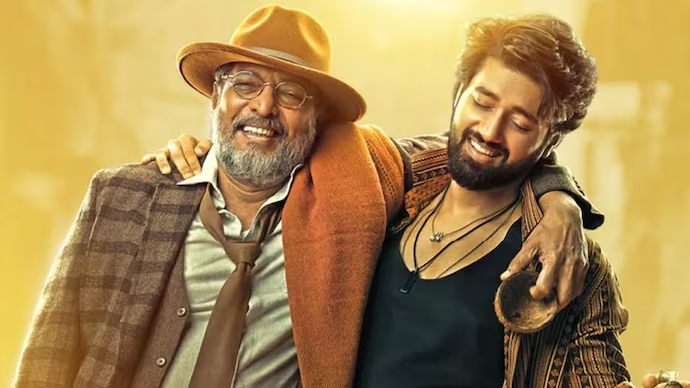A struggling Nana Patekar in a confused Anil Sharma film
There’s little restraint in the story and more of a stretched effort to justify character arcs. The love story between Veeru and Meena is connected rather tackily to Deepak’s struggles to reunite him with his family. It also doesn’t help that the film wants us to look at Deepak with an eye of pity and steadfast righteousness. A scene early on has him snapping at a total stranger for disrespecting his dead father while conducting the funeral ritual. The dialogues feel age-old and it doesn’t help that Nana says them with his usual irritant demeanour from his earlier works. Some of it invokes unintended smiles for how sketchy it sounds. Later, at a police station, he lectures a cop on secularism and the duties of a police officer, lending hyper-active energy to his voice. Is this how Nana’s passionate character from Krantiveer (1994) has aged? Unlike Uday Shetty from Welcome (2007), Deepak clearly cannot control himself here.
His performance borders on being too obvious and didactic. The writing doesn’t give him a lot of nuances in order to explore the different facets of a man suffering from memory loss. All that he seems to do is look around with a lost expression on his face as instant flashes of monochrome are juxtaposed together with soppy music. Then there are portions where he talks in detail about global warming, Communism and even Ambedkar, throwing jargon and empty theories. It feels more like an exercise to showcase the actor’s ability to learn lines and deliver them in a concise manner. Utkarsh doesn’t induce a lot of engagement either and seems to lose his pitch, especially in emotional scenes. It is in some of the smaller portions involving Rajpal Yadav, Ashwini Kalsekar and Mushtaq Khan that the film livens up a little. In a genuinely funny scene, Rajpal’s character explains the meaning of a live-in relationship to Maushi, played by Ashwini, describing it as “We are without any reason (Without vows, I am your spouse)”. The songs composed by Mithoon and written by Sayeed Quadri carry a sense of authenticity. However, they are not given the right release through the scenes, thereby shortening their impact.
Vanvas is a film that exists in the past for its dated sensibilities and themes. Coming back after the massive success of Bridge 2Anil etches a forgettable tale here. He tries to connect its simplistic dots to the Ramayana through a rather hollow title, which barely reflects the happenings in the film. It is not exactly a far cry from his melodramatic style, seen earlier in a similar family-drama my (2007). He seems to confuse overlong for epic, loud for heartfelt and themes for message. There’s little to incite and provoke but more to squirm on the seat and tire away.


Comments are closed.